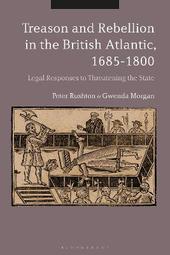
|
Treason and Rebellion in the British Atlantic, 1685-1800: Legal Responses to Threatening the State
Hardback
Main Details
| Title |
Treason and Rebellion in the British Atlantic, 1685-1800: Legal Responses to Threatening the State
|
| Authors and Contributors |
By (author) Peter Rushton
|
|
By (author) Dr Gwenda Morgan
|
| Physical Properties |
| Format:Hardback | | Pages:264 | | Dimensions(mm): Height 234,Width 156 |
|
| Category/Genre | History
World history |
|---|
| ISBN/Barcode |
9781350005310
|
| Classifications | Dewey:345.410231 |
|---|
| Audience | | Tertiary Education (US: College) | |
|---|
|
Publishing Details |
| Publisher |
Bloomsbury Publishing PLC
|
| Imprint |
Bloomsbury Academic
|
| Publication Date |
23 July 2020 |
| Publication Country |
United Kingdom
|
Description
This book examines internal political conflicts in the British Empire within the legal framework of treason and sedition. The threat of treason and rebellion pervaded the British Atlantic in the 17th and 18th centuries; Britain's control of its territories was continually threatened by rebellion and war, both at home and in North America. Even after American independence, Britain and its former colony continued to be fearful that opposition and revolution might follow the French example, and both took legal measures to control both speech and political action. This study places these conflicts within a political and legal framework of the laws of treason and sedition as they developed in the British Atlantic. The treason laws originated in the reign of Edward III, and were adapted and modified in the 16th and 17th centuries. They were exported to the colonies, where they underwent both adaptation and elaboration in application in the slave societies as well as those dominated by free settlers. Relationships with natives and European rivals in the Americas affected the definitions of treason in practice, and the divided loyalties of the American revolutionary war added further problems of defining loyalty and treachery. Treason and Rebellion in the British Atlantic, 1685-1800 offers a new study of treason and sedition in the period by placing them in a truly transatlantic perspective, making it a valuable study for those interested in the legal and political of Britain's empire and 18th-century revolutions.
Author Biography
Peter Rushton was Professor of Historical Sociology at the University of Sunderland, UK. He published widely on witchcraft, problems of marriage and family life, the poor law and crime in C18th England. He was the joint author of Eighteenth Century Criminal Transportation (Palgrave, 2004). Gwenda Morgan was Reader in American History at the University of Sunderland, UK, and has taught at the Universities of Durham and Newcastle-upon-Tyne, UK. Her work has been on early colonial American law and the criminal law in England.
ReviewsProfessors Rushton and Morgan have a crafted a valuable and fascinating survey of the laws of treason and sedition as they developed in the multiple jurisdictions of the seventeenth- and eighteenth-century British empire. * Carlton F.W. Larson, Martin Luther King, Jr. Professor of Law, UC Davis School of Law, USA * Rushton and Morgan have written an imaginative and innovative book which adds a new dimension to the history of the linked issues of treason and rebellion over the period it covers. They are to be especially congratulated in showing how the phenomena differed in the various parts of Britain's 'Atlantic World', and how reactions to them differed according to geographical and chronological contexts. * James Sharpe, Professor Emeritus of Early Modern History, University of York, UK *
|